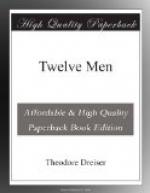“Well, what’s the matter with you now?” It was Culhane, eyeing him most severely.
“I hef hurt my foot. I kent stay on.”
“You mean you’d rather walk, do you, and lead your horse?”
“Vell, I kent ride.”
“All right, then, you lead your horse back to the stable if you want any lunch, and hereafter you run with the baby-class on the short block until you think you can ride without falling off. What’s the good of my keeping a stable of first-class horses at the service of a lot of mush-heads who don’t even know how to use ’em? All they do is ruin ’em. In a week or two, after a good horse is put in the stable, he’s not fit for a gentleman to ride. They pull and haul and kick and beat, when as a matter of fact the horse has a damned sight more sense than they have.”
We rode off, leaving Itzky alone. The men on either side of me—we were riding three abreast—scoffed under their breath at the statement that we were furnished decent horses. “The nerve! This nag!” “This bag of bones!” “To think a thing like this should be called a horse!” But there were no outward murmurs and no particular sympathy for Mr. Itzky. He was a fat stuff, a sweat-shop manufacturer, they would bet; let him walk and sweat.
So much for sympathy in this gay realm where all were seeking to restore their own little bodies, whatever happened.
So many of these men varied so greatly in their looks, capacities and troubles that they were always amusing. Thus I recall one lean iron manufacturer, the millionaire president of a great “frog and switch” company, who had come on from Kansas City, troubled with anaemia, neurasthenia, “nervous derangement of the heart” and various other things. He was over fifty, very much concerned about himself, his family, his business, his friends; anxious to obtain the benefits of this celebrated course of which he had heard so much. Walking or running near me on his first day, he took occasion to make inquiries in regard to Culhane, the life here, and later on confidences as to his own condition. It appeared that his chief trouble was his heart, a kind of phantom disturbance which made him fear that he was about to drop dead and which came and went, leaving him uncertain as to whether he had it or not. On entering he had confided to Culhane the mysteries of his case, and the latter had examined him, pronouncing him ("Rather roughly,” as he explained to me), quite fit to do “all the silly work he would have to do here.”
Nevertheless while we were out on the short block his heart was hurting him. At the same time it had been made rather clear to him that if he wished to stay here he would have to fulfill all the obligations imposed. After a mile or two or three of quick walking and jogging he was saying to me, “You know, I’m not really sure that I can do this. It’s very severe, more so than I thought. My heart is not doing very well. It feels very fluttery.”




